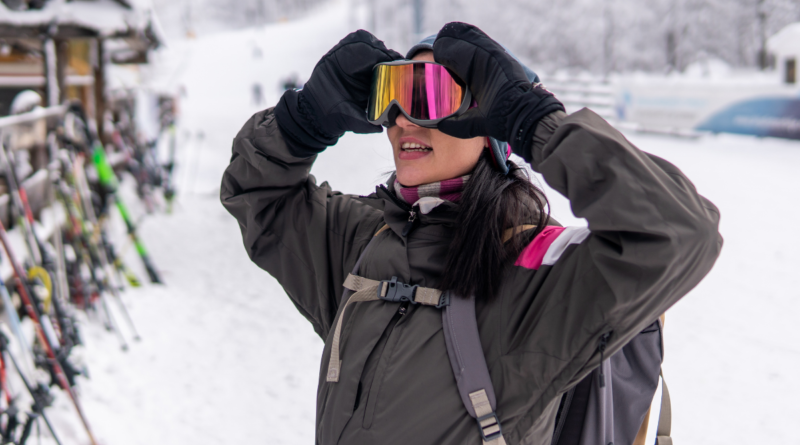How to Prevent Snow Blindness When Skiing
Anyone who’s ever spent some time out in the snow will likely have heard of snow blindness before, or photokeratitis as it’s known in the medical field, but little people actually know much else about it. This condition is common for those who like to ski, snowboard, or mountain climb and it can be quite damaging to your eyes in both the short and long term.
This medical condition has many myths surrounding it, including what the symptoms are, how you can prevent it, and what causes snow blindness. Like most conditions caused by the sun, the best curse is prevention and so it’s essential to understand more about snow blindness and how you can try to prevent it for yourself and others.
Skiing while the sun is shining.
We’ve compiled some of the must-have information about this mystery illness and what it means for those who like to spend their lives on the slopes. A little bit of knowledge now can pay off greatly in the future and ensure you enjoy the great outdoors as healthy and happy as possible.
What Is Snow Blindness?
Snow blindness is a form of photokeratitis, similar to a sunburn that occurs in your eyes. The main area affected by snow blindness is your cornea and this thin layer can become easily burned when it gets exposed to ultraviolet rays.
As the main source of UV rays, the sun is often responsible for snow blindness due to the outdoor nature of activities like skiing and snowboarding.
When the sun reflects off the snow it can do serious damage to your eye, effectively burning it, which is what causes snow blindness. One of the most troubling things about most forms of photokeratitis is that the symptoms won’t be experienced until well after the damage has been done, and so you need to work at prevention rather than treatment.
As a condition, the degree of severity can differ and usually depends on how long you were exposed to the sun for. In very severe cases, snow blindness can even result in a temporary change of colors in your vision or vision loss, but generally, it will cause a lot of pain and discomfort as you wait for it to heal.
Red eye
If you’ve recently spent some time outdoors and in the snow, here are some symptoms you might be feeling if you have snow blindness:
- Pain or redness of the eyes;
- Blurred vision or sensitivity to bright light;
- Gritty feeling in the eye;
- Swelling up or tearing;
- Small pupils and eyelids twitching;
- Headache;
- Seeing halos;
- Snow blindness can feel very similar to sunburn that you might get on your skin elsewhere, and even more painful as it’s on the sensitive part of your eye. These symptoms can easily ruin a skiing vacation and keep you indoors for the next few days as you recover, so it’s not something that you want to leave to chance.
How Can You Cure Snow Blindness?
Some people might not even need a doctor to diagnose them with photokeratitis as it will be obvious that it’s occurred, but if you’re unsure then there are ways to find out. A doctor or optometrist can put a small drop of fluorescein dye in your eye to check for eye damage or have you do a series of tests, and it should be fairly simple to diagnose.
Just as with sunburn on other parts of your body, there is no miracle cure but rather a length wait until your body begins to heal itself. The best thing to do is stay in a room away from sunlight, place a cold washer over your eyes to soothe them, and use over the counter medicine to help relieve the pain that you might be having.
According to the American Academy of Ophthalmology, symptoms usually last for a day or two before you begin to feel better. However, after experiencing snow blindness just one you’ll likely never want to go through it again, and so the best thing to do is protect your eyes from UV rays before they even stand a chance to do harm.
How To Prevent Snow Blindness
Although time will generally heal all symptoms of snow blindness, the best thing to do is actively work to prevent it. Anyone who spends time in the snow will understand the importance of protecting their eyes for this very reason, and so snow blindness goggles are the easiest thing you can do.
Be careful when shopping for goggles as there are many out there that don’t offer the UV protection you need to prevent this condition. When out in the snow, the sun’s reflection can be even more damaging than if you were laying on a beach, so don’t forget about applying sunscreen to the rest of your skin and keeping your sensitive eyes covered.
A Serious Condition For Skiers
People often think more about the other bits of gear they might need for skiing or snowboarding such as their skis and boards, and overlook the importance of protecting yourself from the elements. In such cold conditions it can be easy to forget how powerful the sun is, and so we often neglect to cover our eyes as we would on a day out on the beach.
Skier with ski goggles
The simplest solution to protect yourself and your vision from snow blindness is to invest in the right pair of goggles. Ski goggles these days don’t need to be expensive just to be good quality, so long as they have the important features needed to shield your eyes from the harsh UV rays.
Any outdoor activity should come with the right planning and preparation to make sure it’s enjoyable for all involved, so don’t let something as simple as ski goggles put a dampener on your snow vacation.

